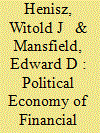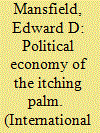| Srl | Item |
| 1 |
ID:
168549


|
|
|
|
|
| Summary/Abstract |
Over the past three decades, numerous countries have engaged in financial reform, prompting widespread interest in the sources of this development. Virtually all of the studies conducted on this topic, however, have focused on explaining neoliberal policy adoption in the financial sector, without addressing whether the adopted reforms actually generate neoliberal economic outcomes. This gap in the literature is important because many policy reforms are not implemented or enforced. In this article, we conduct one of the first studies of the conditions under which de jure financial reforms are implemented, yielding de facto financial liberalization. We argue that democracy inhibits de facto financial reform when society at large is dissatisfied with government. Under these circumstances, democratic officials may be tempted to announce but not to follow through on financial policy liberalization or be unable to follow through, either fearing or facing opportunistic political opposition from legislative or partisan veto players who either represent or seek the electoral support of interest groups harmed by implementing financial reforms. Based on an analysis of ninety countries from 1980–2005 corroborated by a series of illustrative case studies, we find considerable support for this argument.
|
|
|
|
|
|
|
|
|
|
|
|
|
|
|
|
| 2 |
ID:
148027


|
|
|
|
|
| Summary/Abstract |
In this paper, I conduct the first cross-national study of the political economy of gratuities. Existing efforts to explain cross-national variations in tipping either approach this topic from a social-psychological or an economic perspective. In contrast, I argue that the diffusion of American tipping norms contributes to cross-national tipping patterns and that visits by foreign travelers to the United States are the central path through which these norms spread overseas. Consistent with this argument, I find that non-immigrant admissions to the United States are strongly and positively linked to restaurant tipping rates. Further, increases in such admissions have spurred a rise in tipping rates. From the standpoint of the domestic political economy, various observers argue that patrons leave larger tips in poorer countries and countries marked by poor labor conditions. However, my results provide little indication that these factors directly bear on cross-national tipping patterns. Instead, the existence of a service charge constitutes the only domestic factor that directly affects tipping rates.
|
|
|
|
|
|
|
|
|
|
|
|
|
|
|
|